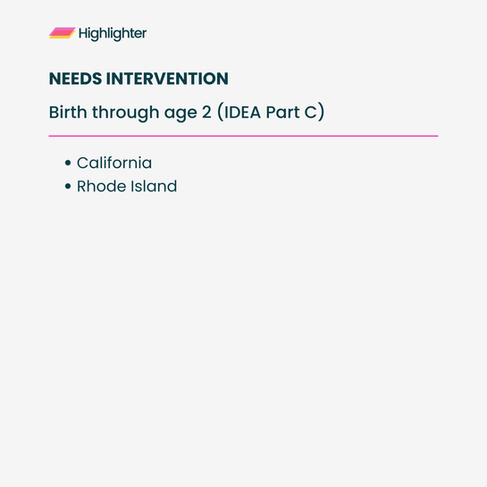How Does Your State Stackup? What You Need to Know About IDEA Implementation for the 2024-2025 School Year
- Jul 16, 2024
- 3 min read
Updated: Jun 24, 2025
Hey there, fellow advocates! As the 2024-2025 school year kicks off, it's the perfect time to understand how your state measures up to the Individuals with Disabilities Education Act. Each year, the Department of Education assigns states a determination of "Meets Requirements," "Needs Assistance," or "Needs Intervention." Knowing where your state stands can help you be a more informed and effective advocate for your child's education. While IDEA provides the map, state implementation is where the rubber meets the road.

IDEA Implementation for the 2024-2025 School Year: A Mixed Bag
The U.S. Department of Education's 2024 annual determinations show significant variation in how states implement the Individuals with Disabilities Education Act (IDEA). Basically, IDEA implementation in the 2024-2025 school year is all over the place.
33% of states consistently achieve the highest rating, "Meets Requirements," for both Part B (ages 3-21) and Part C (birth through age 2).
35% of states meet the requirements for Part B, while 54% meet the requirements for Part C.
Many states fall into the "Needs Assistance" category, requiring additional support to fully comply with IDEA standards.
A few states face major challenges, landing in the "Needs Intervention" category, which highlights significant issues in their implementation of IDEA.
For example, states like Connecticut and Massachusetts generally meet requirements, while states such as California and Texas have needed assistance for multiple years in a row. This uneven landscape means that the quality of special education services can vary dramatically depending on where you live.
Why State Implementation of IDEA Matters
IDEA is a federal law ensuring children with disabilities receive a Free Appropriate Public Education (FAPE) tailored to their unique needs. States are required to implement IDEA and are monitored by the U.S. Department of Education. But what does this mean for you and your child?
States must provide:
Timely and Appropriate Evaluations: Ensuring children are assessed in all areas of suspected disability.
Individualized Education Programs (IEPs): Customizing education plans to meet the specific needs of each child.
Least Restrictive Environment (LRE): Educating children with their non-disabled peers to the maximum extent appropriate.
Parental Participation: Involving parents in all decisions regarding their child's education.
Barriers to Implementation
Unfortunately, ensuring states uphold these obligations isn't always straightforward. Here are some common hurdles:
Lack of Resources: Many schools struggle with limited budgets and staffing shortages, which can delay evaluations and reduce the quality of IEPs.
Inconsistent Oversight: The enforcement of IDEA can vary significantly from state to state and even between districts within a state.
Complex Legal Processes: Navigating the legal landscape of IDEA can be overwhelming for families, often requiring specialized knowledge and persistence.
Overcoming the Barriers
Understanding your rights and the responsibilities of your state can empower you to advocate effectively for your child. Here are some strategies to overcome these barriers:
Stay Informed: Familiarize yourself with the basics of IDEA and your state's specific implementation guidelines. The U.S. Department of Education provides valuable resources and updates on state performance.
Documentation: Keep meticulous records of your child’s evaluations, IEP meetings, and communications with school staff. This helps in ensuring accountability and tracking your child’s progress.
Seek Support: Don’t go it alone. Join local parent advocacy groups or seek assistance from organizations dedicated to supporting families navigating special education.
Use Technology: Platforms like Highlighter can provide personalized guidance, document assistance, and help you stay organized throughout the IEP process.
Legal Action: If necessary, you have the right to pursue dispute resolution options such as mediation, due process hearings, and filing complaints.
The Importance of Family Engagement
Your involvement is crucial. Engaged parents and caregivers can make a significant difference in ensuring their child receives the appropriate education and services. By staying proactive and informed, you can help bridge the gaps that often exist in the special education system.
Be the Champion Your Child Needs
At the end of the day, your advocacy is about more than just compliance—it's about ensuring your child thrives. Knowledge, strategy, and courage are your tools. Remember, you are not alone. With over 7 million children in special education, many families share your journey and are part of a broader community advocating for better outcomes.
So, stay informed, be persistent, and don’t hesitate to seek the support you need. Together, we can push for better compliance with IDEA, ensuring that every child receives the education they deserve.
Let's champion this cause together—because every child deserves to shine.



















Comments